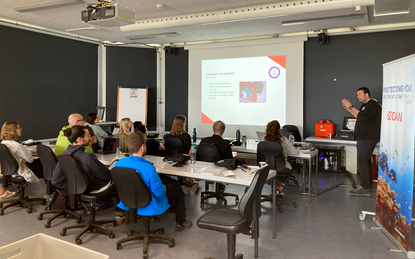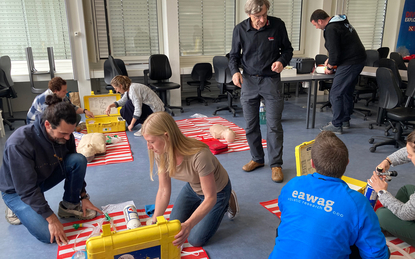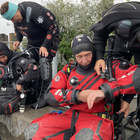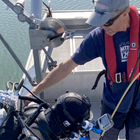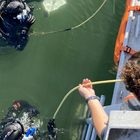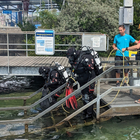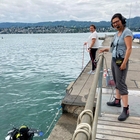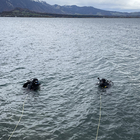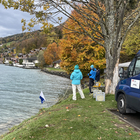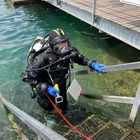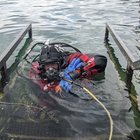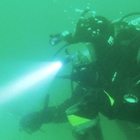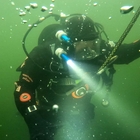Eawag Scientific Dive Unit
The Eawag Scientific Dive Unit was established in 2023 as a support unit for scientific underwater work. It is available for all research departments and consists of a core group of permanent employees and additional, project-related divers. The primary tasks of the diving unit include
- Consulting on scientific diving and snorkeling projects
- Conducting scientific work under water
- Training of new scientific divers
- Provision and maintenance of diving equipment.
The area of operation of the Scientific Dive Unit focuses on inland waters (lakes, ponds, rivers) in Switzerland and other nearby European countries. Dives are carried out from land or from one of our workboats. All Eawag scientific dives are carried out in accordance with the statutory health and safety regulations for work in pressurized environments (underwater) and supplementary internal Eawag safety rules.
As there is no recognized training centre for scientific diving in Switzerland, Eawag provides in-house training for scientific divers. The content of the training is based on the curriculum of the International Diving Schools Association (IDSA) and other European research diver programs or that of the European Scientific Divers (ESD).
What is scientific diving?
Scientific diving is a "working method" that allows researchers to carry out scientific work underwater. The use of a diver enables, for example
- a visual 360° impression of the research area under water
- a selective and gentle sampling of organisms
- targeted installation of underwater instruments
- maintenance of instruments under water
- setting up and monitoring underwater experiments
- the recovery of lost objects.
As employees, scientific divers at Eawag are required to comply with the Ordinance on the safety of workers when working in pressurized environments.
This directive prescribes the use of special equipment (eg. full face mask, communication unit) and the adherence to special safety precautions (eg. hazard analyses) and tasks distribution (dive supervisor, diver, safety diver), which differ from recreational diving.
Training
There is currently no training center in Switzerland that offers training for working in pressurized environments, for which reason Eawag divers must either undergo a training abroad or an in-house training. Eawag internal training courses take place on request.
News and reports
News
Practice-oriented rescue exercise
In order to be able to apply your theoretical knowledge of first aid effectively in emergencies, you need regular exercises. This summer, the Dive Unit organized a realistic practical exercise on Lake Greifensee under the direction of occupational and hyperbaric physician Dr. Jürg Wendling.
The aim was to recognize simulated emergencies in a real working dive, to rescue the diver quickly and safely and to apply appropriate first aid measures. Not only simulating the notification of the rescue organization, but actually making the emergency call via the Rega control center was a novelty for all participants and also very instructive.
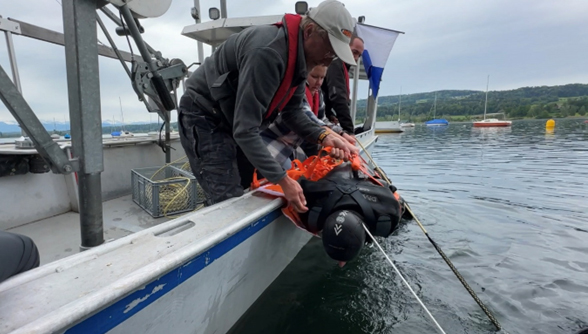
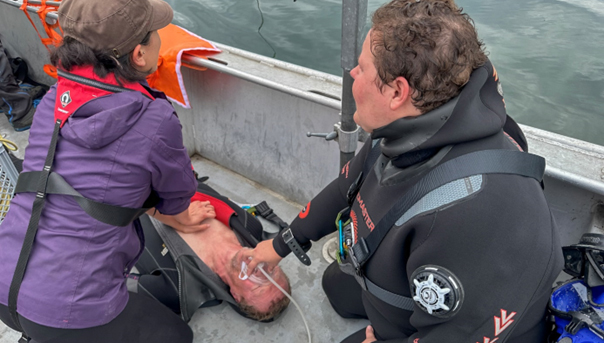
First aid training for divers
In order to be able to react quickly and professionally in emergency situations, regular training is required. For this reason, the Dive Unit once again organised a one-day first aid training course this year that is specifically geared towards the needs of divers. Under the guidance of an instructor from the Diver Alert Network (DAN) and the occupational and hyperbaric physician Jürg Wendling, the correct procedure for cardiopulmonary resuscitation, the use of a defibrillator (AED), clean wound treatment and various options for applying oxygen to alleviate decompression sickness were taught.
Diving projects
The following projects were realized with the help of the Scientific Dive Unit:
Device Testing
For the sampling of aquatic organisms, special adaptations to capture devices are sometimes necessary to ensure their functionality. In other cases, a device may need to be completely redesigned because there is no suitable product available on the market.
The scientific diving unit supports working groups in testing modified or new underwater capture devices for their functionality under water.
Amphipod Traps: (Group: Altermatt, Eco)
This project aims to rediscover long-lost organisms that live in the depths of Swiss lakes. Specifically, it concerns amphipods of the genus Niphargus, which have been found in Lake Geneva at depths of more than 300 meters! With the help of the scientific diving unit, it was possible to verify during a dive in Lake Greifen whether the traps settle in the correct position on the lakebed. The test confirmed the functionality of the traps, and the working group now has the necessary knowledge to investigate even greater depths, such as the 150-meter-deep Lake Walen.
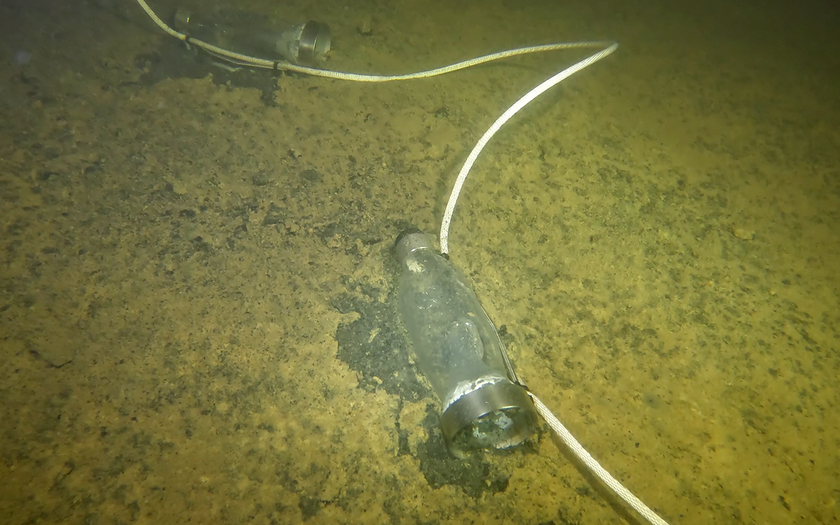
Trawl Gear (Group: Weber, Eco)
The quagga mussel is continuing to spread in Switzerland. To investigate the spread of the mussel in the recently infested Lake Zurich, larger areas will be surveyed for their presence using a trawl gear. For this purpose, a trawl gear designed for hard bottoms is being modified for use on very soft sediment. With the help of observations by divers, the behavior of the device underwater can be monitored, and necessary adjustments to the equipment can be made.
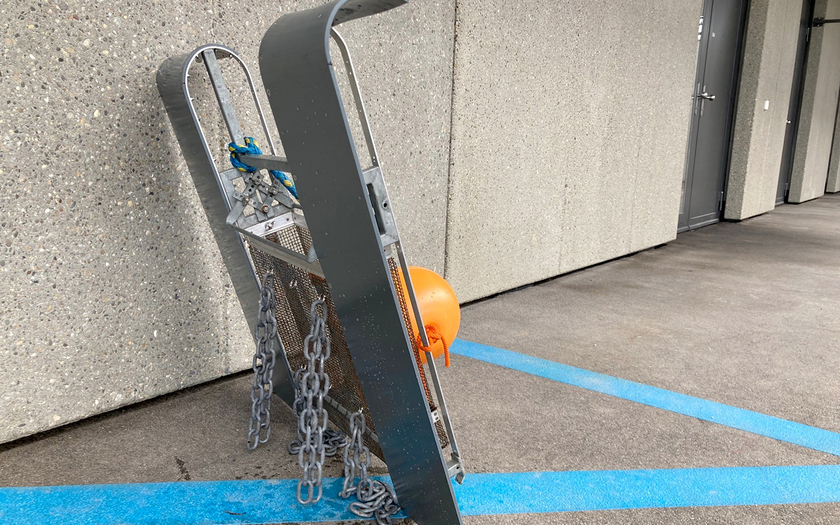
UZH students gain insight into scientific work under water
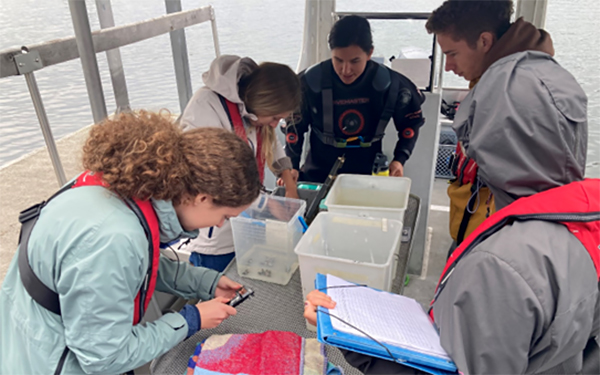
Group: Weber Lab, Department of Aquatic Ecology
The scientific diving unit is currently carrying out a preliminary experiment in Lake Greifensee to determine the growth rate of Dreissenidae (Dreissenid mussels). The aim is to establish a robust method to determine the growth of the quagga mussel in different depth zones in Lake Constance over a longer period of time in a later step. Individually labelled mussels are deployed in a cage at the target depth and recovered monthly by divers in order to subsequently determine the increase in size with the aid of a caliper.
As part of the compulsory practicum of the biodiversity study programme at the University of Zurich, 18 students were given the opportunity to accompany the preliminary experiment and gain an insight into scientific work under water. From October to December 2024, 6 students accompanied the scientific diving unit each month. They were able to participate in the data collection themselves and learnt how mussels are precisely measured. Additionally, they were also taught about the differences between scientific and recreational diving.
Baseline Data Collection on Lake Zurich's benthic Macroinvertebrate Community Response to Quagga Mussel Invasion

Group: Weber Lab, Aquatic Ecology Department
PhD Project: Julie Conrads
Our project aims to establish baseline data on Lake Zurich's benthic invertebrate community before the anticipated quagga mussel invasion, using quantitative suction sampling at seven sites (five in Lake Zurich, two in Obersee). At each site, we will collect a total of 45 random samples from depths of 1m (by snorkeling), 5, and 15 meters (by SCUBA diving), focusing on benthic macroinvertebrates retained on a 500-micron mesh. These data will serve as "year zero" for future studies monitoring benthic community responses to the invasion. Notably, we have already detected the first quagga mussels in Lake Zurich (Cantonal Website), signaling the very early stage of invasion. Fieldwork will be conducted in September 2024 and March 2025.

Native freshwater snail and parasite communities in Lake Zürich
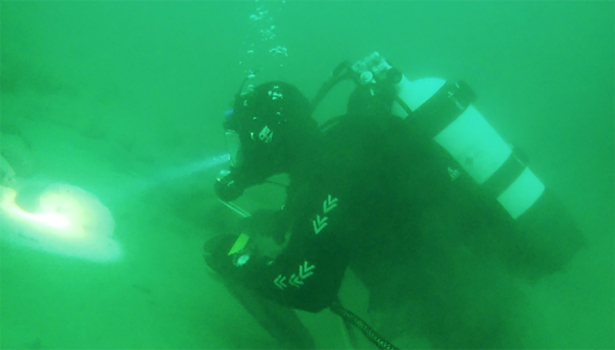
Group: Jokela Lab, Aquatic Ecology Department
Master Thesis: Vincent Pas (Nov 2023- Mai 2024)
Comparison of structure before (1990s) and after (2023) the invasion by Dikerogammarus villosus and Corbicula fluminea
The goal of the study was to provide insights into native snail (Radix sp.) and parasite communities in Swiss freshwater lakes after the introduction of invasive predators such as Dikerogammarus villosus or crayfish species. Study site was the heavily invaded Lake Zurich, whereas Lake Thun did serve as a control lake, as it has no records of invasive predators. Dikerogammarus villosus individuals were usually collected by snorkelling using an underwater vacuum cleaner, provided by Eawag’s Scientific Dive Unit. Snails were picked directly from rocks by hand or forceps.
As Radix sp. inhabit depths between 7 and 20 metres in Lake Thun, sampling there could only be done by SCUBA diving. It turned out that diving is an efficient method as almost 300 individuals could be obtained within two dives."
Conservation genomics of the freshwater duck mussel Anodonta anatina
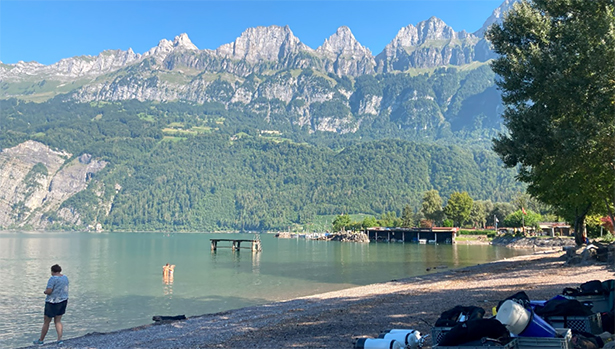
Group: Weber Lab, Department Aquatic Ecology
Master Thesis Project: Julie Conrads (Feb. 2023 – Apr 2024)
This master's thesis investigates the ecological and genetic challenges facing the duck mussel (Anodonta anatina), an important species for water quality and ecosystem. Focusing on the mussel's declining populations in Switzerland, this research aims to examine the genetic diversity and differentiation, and asses the vulnerability of populations. Furthermore, important barriers to dispersal between populations are investigated. Within this project, we generated the first genome assembly of A. anatina. This new reference genome will enable future genomic research on this species such as conservation genomics, species delimitation and the origin and evolution of doubly uniparental inheritance. A field campaign was conducted in Summer 2023 to acquire 425 individual samples from 32 locations, requiring both diving and snorkelling activities within Switzerland's aquatic environments. This master thesis aims to fill the gaps in current knowledge and contribute to more awareness, ensuring the sustainability of freshwater ecosystems in Switzerland.
The scientific Diving Unit
Formal Head of unit
Diver
Dive Safety Officer
Instructor
Supervisor
Operational support
Diver
Diver
Diver
Diver
Diver
Diver

